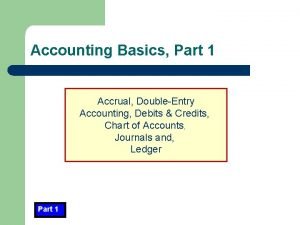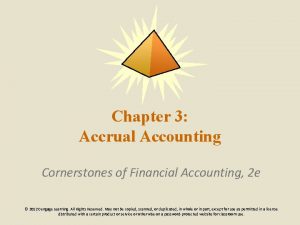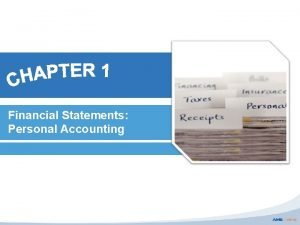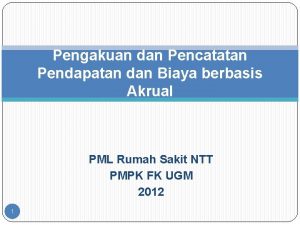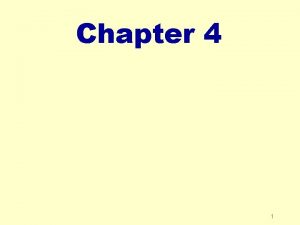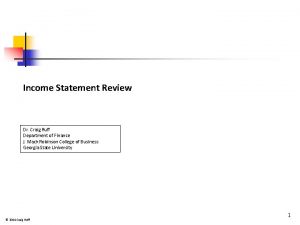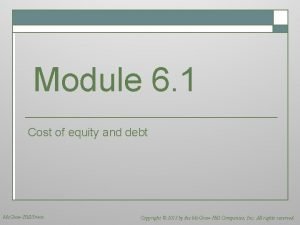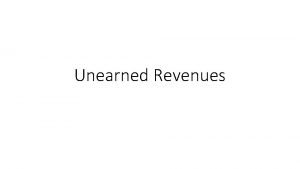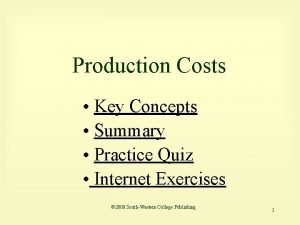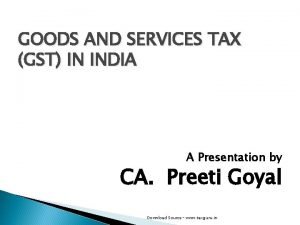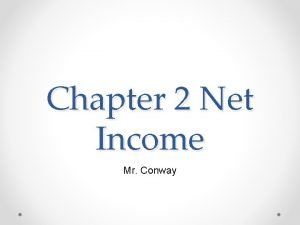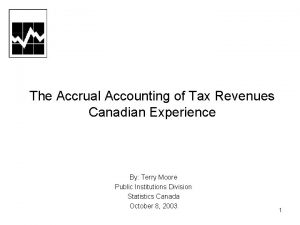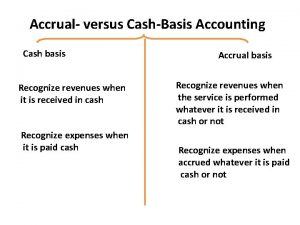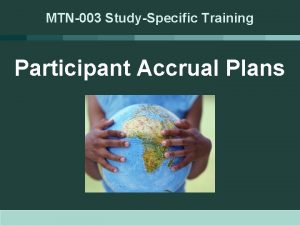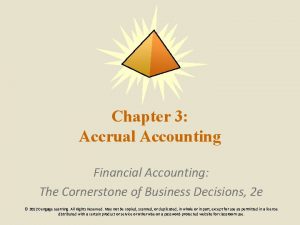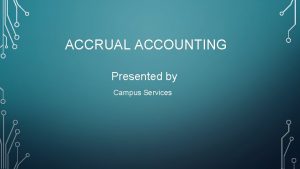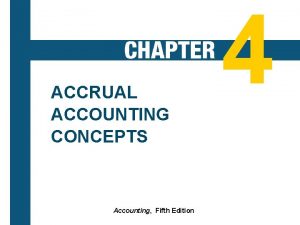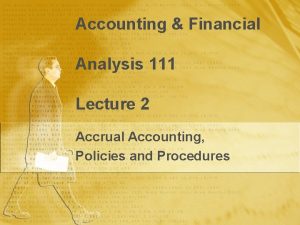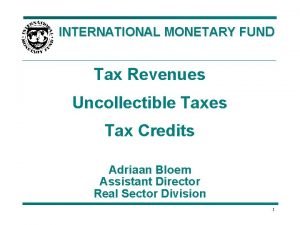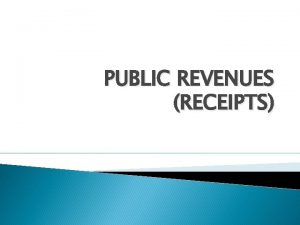The Accrual Accounting of Tax Revenues Canadian Experience

















- Slides: 17

The Accrual Accounting of Tax Revenues Canadian Experience By: Terry Moore Public Institutions Division Statistics Canada October 8, 2003 1

GOVERNMENT Federal Government General Government Ministries, Departments, Agencies and Non-autonomous Funds Autonomous Funds and Organizations Canada and Quebec Pension Plans Canada Pension Plan Quebec Pension Plan Federal Non-autonomous Pension Plans Provincial and Territorial Government Local Government General Government Ministries, Departments, Agencies and Non-autonomous Funds Municipalities and Non-autonomous Funds Self-governing Jurisdictions, Indian Bands and Inuit and Non-autonomous Funds 1 Autonomous Funds and Organizations 1 Provincial Non-autonomous Pension Plans Universities and Colleges Universities 2 Universities 1 Colleges, Vocational and Trade Institutions 2 Colleges, Vocational and Trade Institutions 1 School Boards 2 ________________________________ 1 2 First Nations and Inuit Government 1 Data are not available. Except institutions which are integrated in the federal or provincial public accounts or local government audited financial statements. Revised: August 2000 School Boards 1 Health and Social Service Institutions Health Boards 1, 2 Health and Social Service Institutions 1 Social Service Organizations and Community Boards 1, 2 Social Service Organizations and Community Boards 1 Other Health and Social Service Organizations 1, 2 Other Health and Social Service Organizations 1 2

Current Reporting Practices to Tax Revenue Statistics (OECD) Accounting Basis 2002/2003 ($ Millions) Income Taxes on Goods & Services Other Taxes Federal Government Provincial Government Local Government (Cash) (Modified Cash) 113, 902 65, 364 - 44, 988 59, 082 610 16, 921 33, 361 3

Current Reporting Practices to Revenue Statistics (OECD) Accounting Basis 2002/2003 ($ Millions) Selected Social Security Contributions Employer and Employee Contributions (Modified Accrual) Canada Pension Plan Quebec Pension Plan 23, 540 7, 072 4

Annual Canadian Systems of National Accounts Tax Revenue Calendar year basis Annual Tax Revenue Submission to Revenue Statistics (OECD) Federal and Provincial Governments Fiscal Year Basis – April to March Local Government – Calendar year basis 5

SNA 93 Accrual of Taxes When the activities, transactions or other events occur which create the liabilities to pay taxes Amounts of taxes to be recorded are determined by amounts due for payment when evidenced by: Tax assessment Declarations or other instruments (e. g. sales invoices) which create the liabilities 6

Canadian System of National Accounts (CSNA) Tax revenues –Accrual basis---time shifted cash Federal Governments Custom Duties Provincial and Territorial Government Sales and Motive Fuel Taxes Non-resident withholding taxes 7

INCOME: Taxes on Business SNA practice: Tax liabilities estimates are based on CCRA assessment data and projected on the results of the corporate enterprise survey. Government of Canada (Federal Government) Full Accrual: Monthly cash collections with annual estimates including returns to the end of May. Finance Canada and Canada Customs and Revenue Agency (CCRA) will arrive at accrual estimates. 8

INCOME: Taxes on Production, Products and Imports SNA practice: GST is benchmarked to GST/HST “Pool” data and projected using effective tax rates applied to GDP components Government of Canada (Federal Government) Full Accrual Monthly cash collections with annual estimates including returns to the end of May. 9

INCOME: Taxes on Persons SNA practice: Refunds and payments-on-filing are shown on a cash basis, i. e. in the quarter they are made. Government of Canada (Federal Government) Full Accrual Refunds and payments-on-filing will be shown in the taxation year to which they apply. 10

Corporate Income Tax (CIT) Current CSNA Practice: Corporate income tax liabilities are benchmarked to latest available year of detailed corporate assessment data More recent data are projected using corporate survey data 11

Corporate Income Tax (CIT) (Con’t) Government of Canada Public Accounts Basis Accrual: CIT revenue is primarily based on returns that have been assessed by May 31 CIT revenue closely approximates the cash based method of accounting Estimates of amounts earned, but not yet assessed, are calculated using cash received as a proxy Adjustment for estimated future refunds 12

Personal Income Tax (PIT) Government of Canada Public Accounts Basis - Accrual: PIT revenue is primarily based on returns that have been assessed by May 31 PIT revenue closely approximates the cash based method of accounting Estimates of amounts earned, but not yet assessed, are calculated using cash received as a proxy Adjustment for estimated future refunds which reduces the estimated revenue and records a liability 13

Corporate Income Tax (CIT) and Personal Income Tax (PIT) Large Variations in Payments on Filing, Arrears and Refunds Could Result in Large Differences in CSNA & Public Accounts Accrual Estimates of PIT & CIT Historically Significant Differences in CSNA Accrual Estimates of CIT and Cash Estimates both on a Quarterly and Annual Basis 14

Accounting Basis Used by Governments for their Public Accounts/Financial Statements 2001/2002 Government Tax Revenue Non-Tax Revenue Federal Public Accounts 2001/2002 2003/2004 Cash Accrual Newfoundland Modified Cash Accrual Prince Edward Island Accrual Nova Scotia Accrual New Brunswick Accrual Quebec Cash Accrual (transfers- cash basis) Ontario 2003/2004 - plan Modified Cash Accrual Manitoba Accrual Saskatchewan Income Taxes Accrual Cash only Accrual Provincial Public Accounts 15

Accounting Basis Used by Governments for their Public Accounts/Financial Statements 2001/2002 (Cont’d) Government Tax Revenue Non-Tax Revenue Alberta Accrual British Columbia Corporate Income Tax Accrual Cash Only Accrual Yukon Accrual Northwest Territories Licenses, fees, permits Accrual Cash Only Accrual Nunavut Licences, fees, permits Income taxes Accrual Cash Only Accrual Local Government Municipal financial statements Accrual 16

Non Wastable Tax Credits CSNA: Taxes are gross of the total amount of the nonwastable tax credit i. e. portion that offsets the tax liability plus the transfer component (payment). OECD Revenue Statistics: Taxes are to be gross of only the transfer component of the non-wastable tax credit. Financial Statements of Governments: Taxes are generally net of nonwastable tax credits 17
 Accrual accounting basics
Accrual accounting basics Accrual accounting principles
Accrual accounting principles Personal income statement
Personal income statement Chapter 4 accrual accounting concepts
Chapter 4 accrual accounting concepts Akuntansi akrual adalah
Akuntansi akrual adalah Chapter 4 accounting study guide
Chapter 4 accounting study guide Revenues minus expenses equals
Revenues minus expenses equals Cyclicality of revenues beta
Cyclicality of revenues beta Payback period formula
Payback period formula Revenues minus expenses equals
Revenues minus expenses equals Qs 3-10 unearned (deferred) revenues adjustments lo p2
Qs 3-10 unearned (deferred) revenues adjustments lo p2 Total revenues minus total costs equals
Total revenues minus total costs equals South worcestershire revenues
South worcestershire revenues Total revenues minus total costs equals
Total revenues minus total costs equals What are unearned revenues
What are unearned revenues Total revenues minus total costs equals
Total revenues minus total costs equals Conclusion on gst
Conclusion on gst Find the local tax deducted: $456 biweekly, 2 1/2 % tax.
Find the local tax deducted: $456 biweekly, 2 1/2 % tax.
